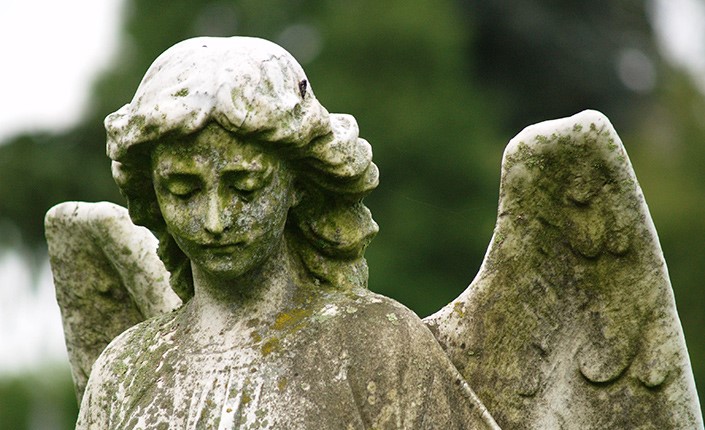For many philosophers, theologians and poets, and for all of us who bring them to life by reading their work in the same shared mystery of awe and creativity with which they wrote, to be human is to suffer. And to be deeply human is to suffer profoundly. It is first to know existential angst and alienation in an indifferent and vast universe. And in looking across society and culture, this alienation only deepens into social anomie that Emile Durkheim found pervasive in modern industrial society. And yet, this experience of alienation, this sense of being apart from the unity of creation, also gives a critical detachment, and initiates one into a lifelong journey for seeking greater meaning, purpose and love. It also inspires a romantic and compassionate vision of a greater reality within and beyond the objective one that is refracted through our reason and senses. In this vision one glimpses the beneficence of creation, and experiences the palpable truth of godly goods of love, empathy, beauty, joy, hope and abundant life. This is what we as believers know in our innermost being and consciousness. This is the very joy of union with God, solidarity with humanity, and knowledge of our own holy self made in the image and likeness of God.
Recognition of this essential human predicament gives birth to the idea of the creative polarity of being and consciousness. At one pole, we experience alienation and critical detachment as we make our way in the material world of man, and at the other, we experience the original blessedness of creation where we find ourselves in unity with creation and living in a greater spiritual realm. For me, I rejoice that Christ gave this realm, which he called the kingdom of heaven, to all those who were poor in spirit whom he blessed. Christ’s mission and teaching is to initiate the disciples and all who wish to follow into this abundant life in a greater spiritual reality.
So given these two ways of being and consciousness, the fully human and the fully divine, I had a sense as far back as I can remember of two ways of seeing and being in the world. This is my “little bipolar way,” a beautiful and unique way of seeing the world, though also one of great suffering and pain. From the poet’s vantage of participant observer, I found in my moving freely through many different social environments as a child, teen and young adult, that I could both appreciate the virtues and beauty in the great variety of people I encountered and see their shortcomings and limitations. I at once felt the joy of being connected to them and the nausea of feeling detached, unable to engage fully, freely, without this awful self-consciousness as set apart and alone.

This capacity and sensibility as an insider-outsider also gave me an historian’s appreciation for the different histories of social groups and communities, as well as a fascination with history writ large. I also intuitively had an anthropologist’s perspective of participant observer of different cultures. Now I find this sensibility a gift of the Spirit of Christ, for this is to follow Christ’s call to compassionate witness and understanding for flawed but divine human beings. It is to try to follow his Sermon on the Mount and truly live in forgiveness, judging ourselves before judging others, and love of one’s enemies. Christ invites us to transcend the bonds of egoism, kinship and tribalism that cause us to prefer those who mirror and enrich our own self-image, who meet our needs and desires. We are called by Christ to overcome our human nature that compels us to prefer and admire foremost those who are like us. To overcome our deeply embedded instinct to survive and indeed flourish by measuring the blessedness of our life by our prosperity, by what we have and can do, by what people say about us. In contrast, Christ calls us to experience a completely different human nature, a spiritual nature, by being with, caring for and loving those who are not like us, those who do not assure us of our own survival and enrichment. This is why Christ resides among the least of us, the poor, the dispossessed, the despised, the outcast. We are to know their suffering and thereby to know with all our heart, mind, soul and body that our purpose is to serve and love others, all of humanity, to seek to heal and make whole those in our midst. This is a burden we can easily bear through the grace of God, for as Christ we do this healing through our own limited and unique journey in life. We have but a short walk in life and yet can make it overflowing with love and compassion, with the people in our midst, the people who come to us in their needs. Are we able to follow this call? Are we able to inspire and support others to serve in their different journeys and walks? For it is through each of us individually that we do the work of Christ, as the body of Christ, ever growing in its height, depth and width, as the very body of God Himself to whom Christ points but leaves a magnificent, unknowable and ever alluring mystery.
I seek every day to have the humility to know I see through a glass darkly, and that I can only imagine the full richness of another human being. This is who I am in Christ. In this way, I try to hold the two poles together in a creative tension. My own individual suffering leads me into empathy for the suffering of others and the realization, no, the instinctive, mysterious desire that wells up in me, to serve and love not just those who suffer but all of humanity, as Christ does. I find resonant at a cellular level Paul’s words that suffering leads to perseverance to character and then to hope. For only the presence of God and the power of the Holy Spirit can so change human suffering, even the worst agony, so beautifully, so compassionately, so gently, into love, hope, and joy, the joy of being in union with God and each other. The joy of overflowing abundant life, here and now, and forever.
Peace and Hope
1 Therefore, since we have been justified through faith, we have peace with God through our Lord Jesus Christ, 2 through whom we have gained access by faith into this grace in which we now stand. And we boast in the hope of the glory of God. 3 Not only so, but we also glory in our sufferings, because we know that suffering produces perseverance; 4 perseverance, character; and character, hope. 5 And hope does not put us to shame, because God’s love has been poured out into our hearts through the Holy Spirit, who has been given to us. Romans 5: 1-5
We are saved by faith in Jesus and the ever greater Christ! We are ever made more whole!! I myself as human and divine remain divided, ruled by cultural and historical divisions and oppositions. I find myself immersed in the dualities of hope and despair, courage and fear, love and loneliness. Only in spiritual unity with Christ do I transcend this polarity. What is more I recognize this polarity is my original and unique gift from God (as each person similarly has their own gift to share) so that I can respond to it through grace and faith, and thereby find a spirit of peace and reconciliation. How wonderful that this spirit lives within me, in the innermost sanctuary of Christ that is my whole being!
And suffering not only leads to hope, it also brings empathy and identification with the pain and suffering of others, and the metanoia that we are here to be in solidarity with one another, to comfort and to heal, to care for and love one another. Christ’s message is that simple. And it is in becoming part of this great suffering body of Christ, the body of humanity, that we are filled with and led by the Holy Spirit. We escape the puny prison of the ego, its values, desires and illusions. To be human is to suffer. From the very moment of birth, we suffer in the subtle beginnings on a cellular level as cells die the moment we are born. And then we experience greater forms of suffering in our shared encounter with our mortality, and then we may witness or directly experience the suffering of diseases like cancer or the tragedies of man’s barbarism of war and terror.
Yet God uses this suffering to give us the poverty of spirit to yearn and hunger for a greater spiritual reality and to discover and delight in awareness of God! Suffering often is the only way we can break free of the prison of the ego and its darkening of the world to what can be possessed through our own will to pleasure, power and meaning.
What joy to discover we are ever held in the gentle hands of God. We are never alone. In our sanctuary of hope, we are ever lifted up by the everlasting arms of God
Joy and suffering are indeed woven together in the complex loom of the ascending and descending threads of life. For as suffering leads to greater joy, so too does joy lead us to suffering. In the pure experience of joy, we truly feel God’s pleasure. Everything is wondrous and new in the world. But one soon finds that the feeling begins to change, and the sublime feeling becomes more a selfish emotion the more we attempt to hold onto it for our self. It returns us to self-consciousness and our old egoistic self. And we move away from the sense of unity with God and toward a more base human emotion the longer we remain in this feeling of our own joy. However, in Christ, our joy doesn’t take this course but leads us to seek to share it, to bring our hope and closeness to God to those who are suffering and in need. We are moved not inwardly but outwardly to regain our solidarity with humanity by going to where God is now pointing us. To honor our joy we take it to the joyless, to those who are suffering, and in this mutual reciprocal fellowship we experience the presence of God, the whole-making healing of transcendence, of living in the kingdom of heaven given by Christ to all who are poor and poor in spirit. Does this not include every human being?



